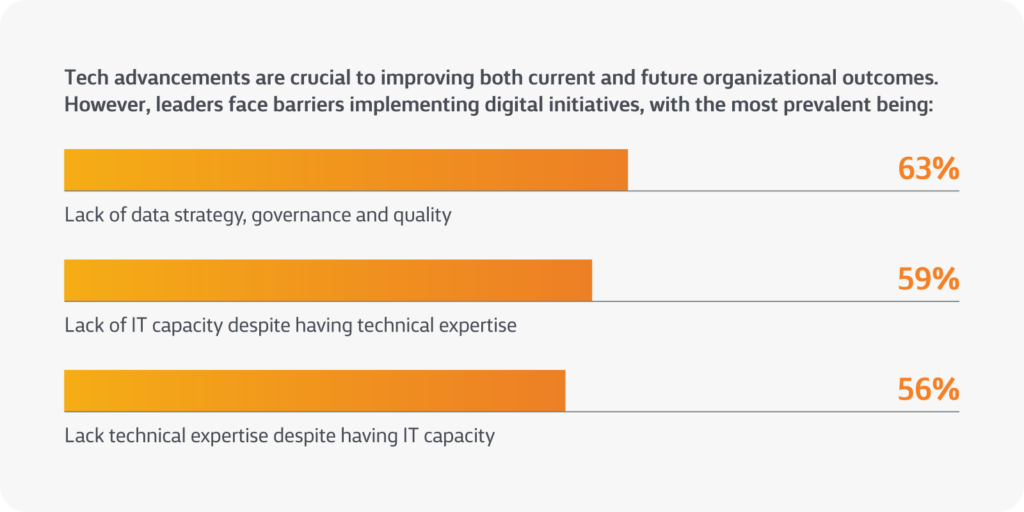
Summary:
Digital transformation is essential for businesses aiming to stay competitive and innovative. New research reveals that digital leaders are prioritizing agility, security and CX, but a lack of IT skills and resources are holding them back from making meaningful progress. As a result, they’re turning to IT managed services providers to overcome these barriers and accomplish their digital objectives.
Digital transformation is a pivotal strategy for businesses seeking to remain competitive and future fit. With the continuous development of new technologies and business strategies, this digital evolution is never ending.
According to new research by Forrester Consulting, digital leaders are currently prioritizing improvements to agility, security and customer experience (CX). However, a number of challenges stand in their way, the most critical being IT skills and resource shortages, and 61% say their organizations have not made as much progress as expected.
Here, we’ll explore the latest digital transformation trends, challenges and initiatives, as well as the steps digital leaders should take to overcome barriers to innovation.
Trends in digital transformation
1. Increased focus on agility and adaptability
Modern businesses are focused on improving agility and adaptability to respond swiftly to market changes and disruptions. The study found that 44% of digital leaders identified increasing agility as their primary strategic goal, underscoring the need for flexible IT infrastructure and adaptive business processes that can evolve in response to new challenges and opportunities.
2. Heightened emphasis on security and privacy
Security remains a cornerstone of digital transformation efforts. In response to the growing prevalence of cyberthreats, 43% of organizations are working to enhance their security and privacy capabilities. In addition to implementing robust cybersecurity measures, they are also building continuous monitoring and improvement into their business models.
3. Continuous improvement of customer experience
Delivering a better CX is a top objective for 42% of digital leaders. Companies are investing in customer relationship management (CRM) software and other tools to better understand and meet customer expectations and needs.
By focusing on CX, organizations can drive innovation and build stronger, more loyal customer relationships — an essential objective, considering 31% of consumers will switch to a competitor after just one negative experience with a company.
Barriers to digital transformation
Despite the strong emphasis on digital transformation, many organizations report slower-than-expected progress. Sixty-one percent of digital leaders feel their organizations have not made the desired progress, and 58% expect it to take two or more years to see meaningful results. Respondents cited these three factors as the top barriers to digital transformation:
1. Lack of data strategy, governance and quality
A fundamental barrier to digital transformation is the absence of a comprehensive data strategy. The study revealed that 63% of organizations struggle with data governance and quality issues. Without a clear strategy for managing and utilizing data, businesses find it challenging to secure their information and derive actionable insights for data-driven decision-making.
2. Lack of IT expertise
Even when organizations have a strategy and the necessary in-house expertise, they often lack the capacity to implement and sustain digital transformation projects. Fifty-nine percent of business leaders surveyed stated that they do not have enough IT staff to handle the workload, leading to delays and incomplete projects.
In recent years, IT skill shortages have made it increasingly difficult for organizations to keep up with the pace of technological change and maintain operational efficiency.

Key digital transformation initiatives
1. Partnering with IT managed services providers
Digital leaders are proactively partnering with IT managed services providers (MSPs) who can bridge the gaps in expertise and capacity that are holding them back from achieving their digital transformation objectives.
By teaming up with secure, reliable MSPs, they can gain the specific skills and expertise they need to leverage powerful cloud technology, robotic process automation and other digital solutions to gain a competitive advantage. These strategic partnerships provide the necessary support to drive transformation forward effectively.
2. Prioritizing security and data governance
Recognizing the critical role of security and data governance, digital leaders are making these areas a top priority. They are developing robust data strategies and collaborating closely with IT MSPs to implement best practices in data governance and cybersecurity. MSPs are playing an essential role in helping organizations ensure that their data is well-managed and protected from breaches.
3. Fostering cross-functional collaboration
Successful digital transformation requires seamless collaboration across various departments to ensure that the final outcome supports business operations, as well as customers’ and employees’ needs.
Digital leaders are establishing dedicated cross-functional teams to align different parts of the business toward common goals. This approach breaks down silos, fosters innovation and ensures that everyone is working together to facilitate smoother and more effective transformation efforts.
The role of IT managed services in digital transformation
As organizations navigate the complexities of digital transformation, IT managed services providers play an essential role in supporting these efforts. MSPs offer the expertise, resources and strategic guidance necessary to overcome the current barriers to effective digital evolution.
To explore these insights further and see how IT managed services can drive your digital transformation, download the full Forrester Consulting study commissioned by Windstream Enterprise. Reach your digital goals and future-proof your business with expert guidance and strategic partnerships.
Download the full report here and transform your digital strategy today.
